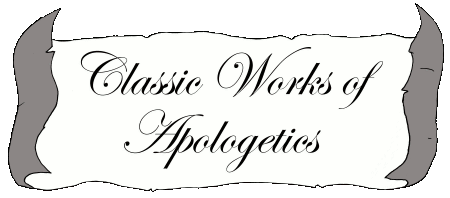

"Revelation has been assailed by adversaries of no ordinary character. All that learning could discover, all that eloquence could allege, and all that wit, sophistry and cunning could contrive and assert, have been employed to injure the christian cause. But these things have only called forth the most splendid talents on the side of that cause. The most powerful productions of human genius and industry have been furnished by the advocates of christianity; and in this interesting field of labour some of the most exquisite intellectual repasts are to be found. In profound and masterly argument, we have nothing to compare with the Analogy of Butler, and the Defence of Miracles by Campbell. In laborious, patient, and candid research, the world has furnished nothing superior to the works of Lardner. In luminous and unanswerable reasonings, where is the volume that will admit of comparison with Paley? These are the mighty masters in the school of argument and philosophy: but the time would fail to enumerate the names and do justice to the labours of Cudworth, and Baxter, and Newton, and Locke, and Leland, and Addison, and Chandler, and Littleton, and West, and Watson, and Hailes, and Porteus, and Jenyns, and Chalmers, and Haldane, and Erskine, and Mearns, and Bogue, and Beattie, and Gregory. In the writings of these, and many others that might be mentioned, the ablest defences of the truth are to be found. The man who is unacquainted with them has yet much to learn, and much enjoyment of an intellectual nature to acquire: while he who knows them, and can yet treat with levity the cause which they advocate, has much to answer for at the bar of God."
--William Orme. "The Advantages of an Enlarged Acquaintance with the Evidences of Revelation," in Lectures on Some of the Principal Evidences of Revelation; Delivered at the Monthly Meetings of the Associated Ministers and Churches of the London Congregational Union. London: B. J. Holdsworth, 1827, pp. 20-38.
What do we mean by "classic"?
By "classic" we mean:
....as defined by the American Heritage Dictionary.
The works on this site provide answers for those investigating the claims of orthodox Christianity. They address the centuries-old arguments from skeptics, and demonstrate the intellectual and historical foundations of the Christian faith.
Most of these works are in the public domain. For those that aren't, we have secured permission to post them here for personal, scholarly, non-commercial use. We also link to other sites that possess the material, such as Christian Classics Ethereal Library. Another valuable resource is Library of Historical Apologetics. If there is no link, these are "recommended reads" which we hope to be able to post someday or else are "coming soon."
We hope you enjoy these works and learn from them as they form an essential part of our apologetics heritage. More will be added as we seek permission or find more material.
How to use the collection
Works are indexed by author last name. We also have a Special Collections section where items are arranged by topic.
Disclaimer
We don't commit to any one apologetic style, but endeavour to provide a comprehensive bibliographic approach to all legitimate ways of defending the faith.
Discussion? Corrections? Contributions?
We have a thread on the TheologyWeb forum where you can post questions, make recommendations, or otherwise note issues with the site. See here.